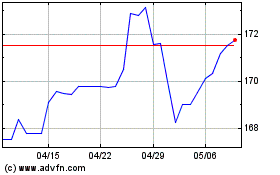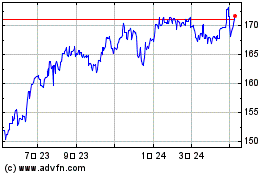ECB Set To End QE Era
2018年12月13日 - 12:15PM
RTTF2
Marking the end to an era of unconventional, and at times
controversial, policy making, the European Central Bank is set to
confirm on Thursday that its four-year long quantitative easing
programme, which saw the bank buying EUR 2.6 trillion worth of
bonds in a bid to rescue the Eurozone economy, will conclude in
December.
While quantitative easing, or QE, served the US well, the
unorthodox policy measure produced mixed results for the 19-nation
euro economy. The Asset Purchase Programme, or APP, and the
consequent expansion of the bank's balance sheet often came in for
sharp criticism from hawks on the Governing Council such as the
Bundesbank's Jens Weidmann.
The Governing Council, led by ECB President Mario Draghi, is set
to announce its latest policy decision at 7.45 am ET in Main,
Frankfurt, when the bank is also expected to confirm its earlier
stance that the APP will stop at the end of this month.
The main refi rate is currently at a record low zero percent and
the deposit rate at -0.40 percent. The marginal lending facility
rate is at 0.25 percent.
Supported by the ECB's stimulus, the euro area economy expanded
2.5 percent in 2017, the fastest pace in a decade. However, the
momentum slowed this year and the bank is set to end asset
purchases at a time when the economy is showing signs of a
sustained slowdown. In September, the ECB Staff trimmed the growth
projections for this year, and next, to 2 percent and 1.8 percent,
respectively. Draghi will release the latest set of projections on
Thursday that is expected to reveal a further downgrade of the
forecast for the coming years and refer to downside risks.
Inflation is yet to embark on a sustainable path to hit the
ECB's target of "below, but close to 2 percent", confounding the
bank's projections. Core inflation, which excludes energy, food,
alcohol & tobacco, has been hovering around 1 percent in the
past several months. The bank maintained its inflation projection
for this year, next and 2020 at 1.7 percent in September. ECB
policymakers, including Draghi and its Chief Economist Peter Praet,
has repeatedly signaled that the end of asset purchases does not
mean policy tightening is imminent. The bank is expected to
reaffirm its accommodative stance on Thursday to bring inflation to
target.
In this regard, what the ECB does with the EUR 2.6 trillion
worth of bonds it has bought under APP is significant and many
economists expect this would be one of the most important matter
for discussion in the latest policy session.
Thus far, the ECB has maintained that it intends to reinvest the
proceeds from the sale of bonds bought under the APP "for an
extended period of time after the end of the net asset purchases".
Markets expect the reinvestment to continue until late 2020.
The current forward guidance of the ECB suggest that an interest
rate hike is likely only in late 2019. Given the weaker growth and
inflation outlook, and the persistent uncertainties linked to
global trade and politics, some economists now expect the bank to
raise interest rates only in 2020.
That would make Draghi, the only ECB President thus far, who did
not raise interest rates during his tenure. Praet's term is set to
end in May next year and Draghi's tenure in October.
Fitch Ratings on Wednesday predicted that the ECB is set to
change its forward guidance on interest rates in the next few
months.
"While the weaker outlook for growth and inflation is very
unlikely to prevent the ECB from ending QE in December, its
termination at a time of growing uncertainty may necessitate a
lower-for-longer accommodative monetary policy stance, in order to
lift inflation towards target," Fitch said.
Eurozone interest rates were raised last in July 2011 by 25
basis points. Economists also speculate a return of another of
ECB's unorthodox policy tools - the Targeted Longterm Refinancing
Operations or TLTRO, in the coming months. Under this, the ECB
gives longer-term loans to financial institutions at attractive
rates to boost lending in the real economy. "A new TLTRO in the
summer of 2019 with a variable interest rate could be a way out but
currently comes too early, as it could be perceived as direct
support to Italian banks," ING's economist Carsten Brzeski said.
During the post-decision press conference, Draghi is set to face
questions on the Italian budget crisis and the Yellow Vest or
"gilets jaunes" anti-government protests in France, both posing
risks to Eurozone growth. The APP was implemented in 2015 and the
monthly asset purchases at the beginning was EUR 60 billion, which
was raised to EUR 80 billion in 2016. The size of monthly asset
purchases was scaled back to EUR 60 billion in 2017 and to EUR 30
billion at the start of this year.
In June, the ECB announced that its monthly bond purchases will
be halved to EUR 15 billion in September, and said it will continue
so till the end of December.
CHF vs Yen (FX:CHFJPY)
FXチャート
から 3 2024 まで 4 2024

CHF vs Yen (FX:CHFJPY)
FXチャート
から 4 2023 まで 4 2024
